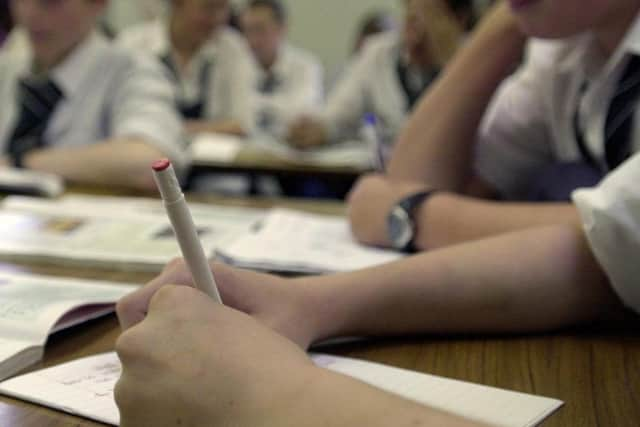School exclusions in Leeds 'increasing dramatically in poorer areas of the city'
and live on Freeview channel 276
The authority’s head of service learning inclusion Val Waite also told a panel of councillors that the number of children being handed fixed term school exclusions – also known as “suspensions” – was increasing most dramatically in poorer areas in the east and west of the city.
The comments were made during a meeting of the authority’s Children and Families scrutiny board, which discussed its paused inquiry into “off-rolling” and fixed term exclusions.
Advertisement
Hide AdAdvertisement
Hide AdPrevious evidence sessions given to the inquiry heard from experts, who were concerned increasing numbers of children being electively home-educated could be a result of schools encouraging families to un-roll their children from school to avoid the prospect of permanent exclusion.


Ms Waite said that the numbers of home educated pupils appeared to be rising and were “significant”, but added this may also be due to new factors, such as anxieties around the Covid-19 pandemic.
“We have seen yet again the numbers of elective home education rising,” she added. “We have now got about 900 young people being electively home educated in the city. The normal figure for Leeds is about 650 per year.
“That is a significant number. Through Covid it rose to about 840 – now it is rising yet again.
Advertisement
Hide AdAdvertisement
Hide Ad“It seems to be families rather than individual young people in a family. It also seems to be connected to particular cohorts or groups. There is a high representation in the BAME community of elective home education. We are seeing less key stage four (GCSE) pupils that are in elective home education.
“The other group not returning are those giving the reason of high levels of anxiety due to Covid, and families are also feeling they don’t want their children to go back into school just yet.
“It could well be that picture changes in September, and families are waiting through this summer period. By the end of the Autumn term, we should be able to look at the numbers.”
The inquiry had previously heard how the number of fixed term exclusions had increased dramatically over the years; while internal exclusions – known as isolation – were not measured in many schools, as they were not obliged to provide the data.
Advertisement
Hide AdAdvertisement
Hide AdMs Waite said that the last verified data available to the council was from the academic year 2018/19, and that the Covid-19 pandemic, with its effects on school attendances, had since muddied the waters.
She added: “We have got recent unverified data that has started to come in. With that data, we have contacted the schools themselves and asked them if we can support them in anyway and help look at individual young people who are subject to fixed term exclusions.
“This work is particularly focussed in the east of the city there are high levels of deprivation, and lots of poverty. There is a high correlation of children not attending school or them being fixed term excluded.
“There is a project in the west of the city, where data, although unverified and we must be cautious, is looking as if we have higher numbers of fixed term exclusions.”
Advertisement
Hide AdAdvertisement
Hide AdAccording to the council’s own statistics published last November, the number of individual fixed term exclusions in Leeds secondary schools during the 2018/19 academic year rose to 5,733 from 4,485 the previous year – an increase of nearly 30 per cent.
Around 16,630 individual school days were lost by secondary pupils to fixed term exclusions in 2018/19.
The inquiry, which was started in 2019 but was paused during the Covid-19 pandemic, is expected to restart later this year, and members of the panel discussed which groups should be called to give evidence.
Kate Blacker, a schools governor representative, said: “I would be interested to know the difficulties children and young people have coped with the Covid-19 pandemic, and how schools have looked to manage their behaviour.
Advertisement
Hide AdAdvertisement
Hide Ad“On elective home education, it is really worrying that they have gone up, because we know from the imposed home education, it impacted on socialisation and mental health in lots of ways.
“We need to look quite closely at where it is genuinely a choice and where families feel it is imposed on them by virtue of the effects of the pandemic.”
Chair of the committee Coun Alan Lamb (Con) said: “In my ward, we have a secure college of learning – or the young offenders institute – the last time I visited, there were 272 young people there.
“It would be interesting to hear some of their stories. In many cases, temporary exclusions followed by permanent exclusions start a spiral, rather than resolving the issue, and it would be useful to hear some of their stories and what could have been done differently.
Advertisement
Hide AdAdvertisement
Hide Ad“My view is always that we have failed every single one of them that is in there – it’s useful to understand the journey they have been on to get there.”
The panel agreed to restart the inquiry in November 2021.